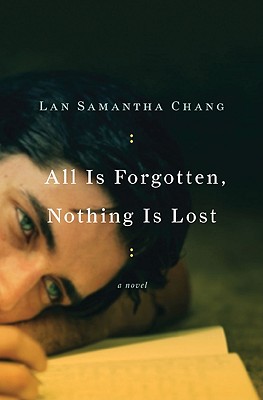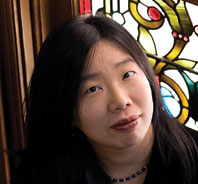Lan Samantha Chang’s second novel follows the determined career of Roman Morris, a respected poet. As the story opens in 1986, he attends Miranda Sturgis’ workshop at The School, a famed creative writing program in Bonneville, Michigan. His colleagues include Bernard Sauvet and Lucy Parry, who will go on to play significant roles in his life. The three-part story ends when Roman is in his fifties, divorced, solitary, inevitably himself.
 Since Chang is the director of the Iowa Writer’s Workshop, poets may want to read All Is Forgotten, Nothing Is Lost if only to hear what she seems to be saying about the teaching of writing and the mentalities of MFA candidates. She begins with a sketch of Roman:
Since Chang is the director of the Iowa Writer’s Workshop, poets may want to read All Is Forgotten, Nothing Is Lost if only to hear what she seems to be saying about the teaching of writing and the mentalities of MFA candidates. She begins with a sketch of Roman:
He was twenty-eight, slightly older than those who arrived at the School fresh from undergraduate study, but he had the same hopes and expectations as they. Or perhaps his expectations were even greater. For three years after college he had worked at a small private bank, and had quit the lucrative job in order to pursue the art of poetry.
Roman had tried to get into Miranda’s seminar the previous spring. He had expressed his interest openly by putting notes – quoting her poems – into her mailbox. He was shunted off into the class of another professor. As a result of this dismissal, he had developed what he thought a healthy objectivity, and he had coined the term ‘acolyte’ to describe those classmates – mostly young women – who hung on Miranda’s every word. He saw himself as an observer, and had concluded that he would keep his own poems from his classmates, would wait until he had assessed how his work would be received.
 Miranda, whose in-class critiques are called “bludgeonings” by her students, “maintained a sterling reputation as a teacher. There was learning and acuity in her body of work: the shimmering debut; the rigorous and ambitious second book; the third book short-listed for several major national prizes. She was considered an accurate and influential judge of talent. It was rumored that she sometimes took a special interest in the career of a young poet, and that her protégés began with a vital advantage.”
Miranda, whose in-class critiques are called “bludgeonings” by her students, “maintained a sterling reputation as a teacher. There was learning and acuity in her body of work: the shimmering debut; the rigorous and ambitious second book; the third book short-listed for several major national prizes. She was considered an accurate and influential judge of talent. It was rumored that she sometimes took a special interest in the career of a young poet, and that her protégés began with a vital advantage.”
Roman “had never encountered a professor so unwilling to be known. Was she indifferent to them, or was she guarding her privacy? Was she cruel, or simply telling them the truth.” Soon, Miranda develops a “special interest” in Roman. Abandoned by his mother at age three, Roman was brought by his grandmother; he never knew his father.
As All is Forgotten, Nothing Is Lost proceeds, Roman’s ambition – its habits, costs, depletions, betrayals, wins and losses – becomes Chang’s central topic. In one sense, this is a writer’s novel, with its fateful Faustian bargains, Rilkean flittings, poetry prize scandals, and exploitative, disintegrating relationships. On the other hand, Chang’s limpid, restrained prose creates characters and situations that will be immediately recognizable to most readers . Her audience strategy requires that she refrain from going too deeply into the nature of Roman’s poetry, and she doesn’t quote it at all. His call-and-response poems are “powerful jigsaw pieces of an intimate world. Who the man and woman were, he could not guess. They had simply spoken, and he had not censored their words, passionate or estranged.”
All is Forgotten, Nothing Is Lost is neither a cautionary tale nor a narrative concerned with gritty realism. Its mysterious power comes from generating both archetype and prototype in simple strokes. Her speaker takes a long and rueful view in an emotionally contained manner, resisting easy irony, and favoring neither sympathy for nor vexation about the infuriatingly enclosed Roman – though both are subtly implied. The suggestiveness in her point of view is managed in such a way as to respect both subject and reader.
 Chang economically uses Roman’s interactions with the supporting players to color his psyche, most memorably via Bernard, a poet so utterly devoted to his trade that Roman’s approach seems compromised in comparison. But how? Is he too shrewd? Too desirous for the unattainable uber-approval? For all the exactitude in the writing and the stark framing of situation, Chang ensures that we don’t understand things too well.
Chang economically uses Roman’s interactions with the supporting players to color his psyche, most memorably via Bernard, a poet so utterly devoted to his trade that Roman’s approach seems compromised in comparison. But how? Is he too shrewd? Too desirous for the unattainable uber-approval? For all the exactitude in the writing and the stark framing of situation, Chang ensures that we don’t understand things too well.
In a masterfully drawn scene, Roman and Miranda meet again at the School a few years after after he graduated and won a major prize. Chang allows the emotional content to emerge quickly and rest on the surface of the page. Its accessibility contrasts with what escapes between the two characters, or at least eludes Roman:
She was watching him more gravely now. He found something familiar in he troubled gaze – the feeling that he must disappoint her and that she would never understand precisely why he must – and at this recognition of the feeling, a feeling he had had half a dozen times, with half a dozen women, but never more acutely than at this moment – he felt a wave of sadness crush his chest, as if she had cast a spell to drown him without water, and he could not breathe …
Miranda had once enigmatically asked Roman and her seminar students, “Who would one rather be? The one who desires, or the object of desire? One’s answer to the question might determine if he is meant to be a poet or something else entirely.” Freud had intimated the same thing: there are those able to enjoy desiring, and those who need satisfaction (to be desired). Chang’s ability to animate this fundamental dynamic makes All is Forgotten, Nothing Is Lost much more than a campus niche novel.
 Is Chang writing about contemporary MFA workshop life at all? Her story and narrative posture seem timeless. But there is one instance, late in the novel, when she attributes a more critical opinion of writing programs to Roman, now a celebrated poet and professor:
Is Chang writing about contemporary MFA workshop life at all? Her story and narrative posture seem timeless. But there is one instance, late in the novel, when she attributes a more critical opinion of writing programs to Roman, now a celebrated poet and professor:
Nowadays, Roman thought, the students expected not only to be noticed, but that their work – however absent the vision, however awkward the execution – be discussed with the assumption that the goals were far-reaching and accomplishment inevitable. Moreover they felt that they were owed these services, as their professors’ end of an official transaction. Many believed that writing could be ‘taught’ by the dissemination of ‘craft,’ and anyone with the smallest speck of ability or desire was entitled to this dissemination. No one bludgeoned anybody anymore. One could write with utter mediocrity, but one had the same right to be treated as if greatness, or, at the very least, publication, were imminent.
William Meredith once wrote, “All the writers who go on concerning us after their deaths are men and women who have escaped from a confused human identity into the identity they willed and consented to.” It is hard to tell if Roman achieves a memorable willed identity in his verse, despite his prizes. But his behavior is apparently ineluctable, his self-reflection inert. He is, as his wife says, a rat. I’ve known lots of poet-rats. But is he a worthy poet or not? I was enmeshed in this question through my reading of this fine novel, and in its afterglow I’m still engaged.
[Published by W.W. Norton on September 27, 2010. 205 pages, $23.95 hardcover]
Chang reading this summer
Loved this review. When she read at the Napa Valley Writers Conference this past summer, the audience chuckled all through the reading. But actually this isn’t a comical narrative at all. If I disagree with you at all, it’s about the speaker’s attitiude towards Roman. I think there’s a “character is fate” flavor to this novel from the outset and an attitude that Roman’s character is so deeply flawed that the reader can’t expect anything but grief to follow. The character of Miranda Sturgis is wonderfully drawn, so simple but so unique. I can’t help but speculate who the model is for this person.
specuate who the model is
I had some thoughts about it:
http://knottprosepo.blogspot.com/2010/09/lan-samantha-chang-jorie-graham-and.html
On Sympathy & Vexation
“Archetype and prototype” — that was very fine. But of course the type we’re most interested in is the type such creatures finally become.
I’ve also known quite a few rat-poets in my life (I might even have been one myself), seemingly fetched up from another place than they had ever actually inhabited — though I usually counted myself lucky to have known them.
One might argue about the proper “stance” a poet should take, if, in the perennial ignorance of the world, he and she will be tolerated; or, to paraphrase one of Dylan Thomas’s prologues to a reading, it is any success to have written marvellous devotional poetry — only then to be seen falling down the stairs, drunk.
But your comments in this review remindrd me a little of what you wrote in yoir Chen review:
“All he ever wanted in his youth was to be a metaphor for something. We tried to keep him sober and productive. But in his epiphanic moments, we could no longer ignore his untrustworthiness. Sensing a shift in our toleration, he toned things down even to flatness.”
Almost as if the dread second album curse in music recordings were deferred until the prize-winning third book of poetry…when it’s probably too late for anyone to get out from underneath it.